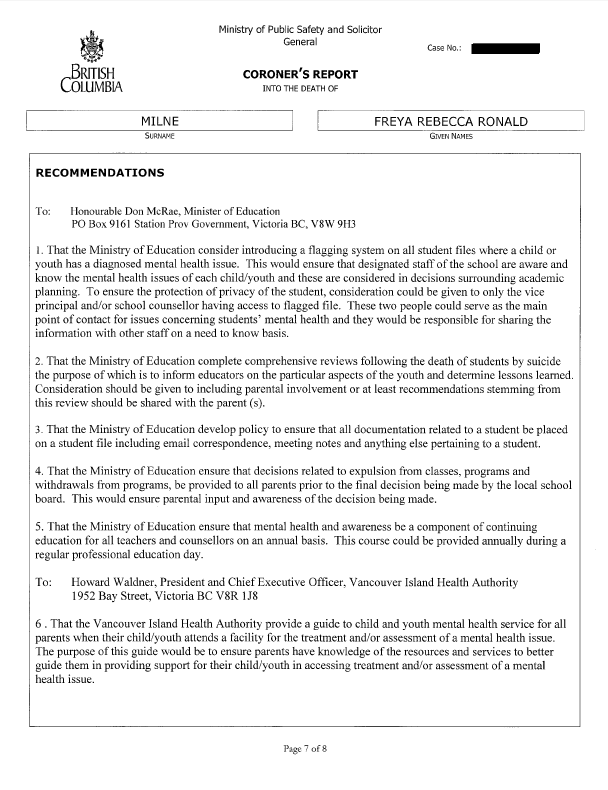Trigger warning: Teen suicide
News Segment on You Tube – 3 min
Coroner recommends flagging students with mental illness in wake of Victoria teen’s suicide
A coroner’s report is calling for the files of all students with a diagnosed mental illness to be flagged, after a Victoria student with an anxiety disorder committed suicide after being kicked out of her school’s gifted program.
Cindy E. HarnettMay 3, 2013 9:46 PM

A coroner’s report is calling for the files of all students with a diagnosed mental illness to be flagged, after a Victoria student with an anxiety disorder committed suicide after being kicked out of her school’s gifted program.
The report is a sober portrait of how the school system failed Freya Milne — an artistic, sensitive 16-year-old with “exceptional abilities and needs.”
Freya drowned Feb. 2, 2010, near Ross Bay. Before her suicide, Freya had been kicked out of Esquimalt High School’s gifted program and prescribed a drug with possible side effects that included increasing suicidal thoughts.
Freya, who had struggled with anxiety and had suicidal thoughts since age 10, died despite policies and systems in place for schools to deal with gifted students and those with special needs, says a report by Matt Brown, the B.C. regional coroner.
Brown made six recommendations, including the introduction of a system flagging files of students with a diagnosed mental illness and a policy that parents be contacted for input before expulsions are finalized.
The report focuses on a crisis point in November 2009, when Freya was told that if she did not complete a required social studies course in the prescribed format, she could not continue in Esquimalt High School’s program for gifted students. She was overwhelmed by the essay component of the course and wanted to take the course though a home-learning-style program.
A similar accommodation had been made the previous year, and school officials — including the vice-principal — approved the alternative, but the request was later denied by the principal.
By all accounts, “Freya’s identity rested largely on being in the Challenge program,” the coroner’s report says.
After Freya’s suicide, the principal told the coroner’s service that at the time, he “was unaware of Freya’s mental-health issue” and that there was nothing on record. “A greater understanding would have led to a different decision,” he said.
However, the coroner notes, Freya’s individual education plan stated she suffered from generalized anxiety disorder.
The coroner also found school documentation showing “concern from school administration that allowing Freya to take her social studies course in another format could have implications for other students.”
An email obtained by the family under the Freedom of Information Act shows the school’s former co-ordinator of the gifted education program saw no compelling reason to give Freya “special treatment” because “she doesn’t want to do an essay.”
The email advises telling Freya that opting out of the class will remove her from the Challenge program and that, hopefully, that will “inspire her to simply do the essay.”
Freya’s mother, Shelley Milne, fought to reverse the principal’s decision. Freya’s anxiety increased considerably. “By the middle of December, she was not able to return to school,” the report says.
Milne appealed to school district management, which reversed the decision, allowing Freya to return for the school’s next term on Feb. 1, 2010, and take the social studies class in the format she wanted.
But during that six-week wait, Freya’s anxiety escalated. During a visit with her psychiatrist on Jan. 14, 2010, Freya and her mother agreed she should be prescribed clonazepam, the report says. That dose would later be increased and the prescription refilled. An investigation found Freya’s mother was aware of the dosage change but not advised of the potential serious risks of the drug.
On the weekend before her scheduled return to school, Freya appeared better, the report says. At her grandfather’s home, she took the rare step of hosting a small social gathering of Challenge classmates. She discussed her mental illness with friends, which was out of character. In retrospect, the family views this as Freya’s good-bye.
The next day, Freya attended her first day of the new semester, as planned. She returned to her dad’s home and went to bed early.
In the morning, she was gone.
Coroner’s Recommendations:
Ministry of Education:
• Introduce a flagging system for all student files where a child is diagnosed with a mental-health problem
• Complete comprehensive reviews to determine lessons learned after the death of a student by suicide
• Develop policy so that any pertinent document — including emails — be placed in a student’s file
• Ensure all decisions regarding expulsion or withdrawal from class be provided to parents for input before a final decision by a school board
Vancouver Island Health Authority
• Provide a child and youth mental-health-services guide to all parents when their child attends a facility or seeks treatment or assessment for a mental-health issue
At a glance: School policies and drug warnings
• The Education Ministry’s own special education services manual of policies, procedures and guidelines notes the need for flexibility for exceptionally gifted students whose individual needs and varying aptitudes “often require a blend of opportunities available both in the school and in the community.”
• Freya’s Individual Education Plan noted she’s a “gifted student who presents with significant anxiety” and during such anxiety episodes “accommodations should be made accordingly.”
• The Challenge Program’s existing criteria for probation and withdrawals states that relevant circumstances, such as health issues, should be considered.
• The Challenge Program’s overview stated its primary goal was to meet learners’ needs, whatever they may be. “We understand that gifted learners come in all shapes and sizes and that not one program meets every learner’s needs.” (This portion was removed from the school’s website in January 2010, the coroner’s report said.)
• Dating back to 2008, Queen Alexandra Centre for Children’s Health records show a safety plan in the event that Freya became suicidal. However, there were no formal assessments on file in the months leading up to her death, the coroner found.
• Clonazepam is in a class of medications called benzodiazepines used to treat panic disorders. Some research suggests the drug can increase suicidal thoughts, especially during the first few weeks of use. The FDA and the manufacturer advise patients, their caregivers and families to watch for the emergence or worsening signs of depression, thoughts of self harm or changes in mood or behaviour.
Following the suicide
• The Greater Victoria School Board developed a program whereby each month, school officials at each high school report on students possibly requiring intervention — those who are failing, absent, abusing drugs or alcohol are demonstrating body-image changes. A full-time person is dedicated to identifying such students in each school, and referrals to outside help are made when necessary.
The coroner noted this was a positive change, but would not have made a difference in Freya’s overall school plan or connections with school staff.
Here is a link to this document on Google Docs https://drive.google.com/file/d/1FoIcmrfbCz9zLvldO7IXnDeN_C1QjlJ-/view?usp=sharing
Here is the response from the Ministry of Education
https://drive.google.com/file/d/1rrHBIEJfPKrxlKOTineDtE-Mr-ymOWWb/view?usp=sharing
In my view, it’s inadequate.
I struggled to get my daughter an R designation and they had her inappropriately flagged in the “alert” as life threatening and her anxiety was an allergy. The “alert” system is a medical system that doesn’t allow you to modify the options. It’s not intended or designed for mental health options. They aren’t handing out R designations for every student with anxiety diagnosis.

(Scroll down at the end of the page to read text from this image)
Mother of teen suicide victim calls for advocate
Students and parents in conflict with the school system should have an advocate, says Shelley Milne, whose daughter’s suicide is the subject of a coroner’s report. After reviewing the Feb. 2, 2010, death of Freya Milne, B.C.
Cindy E. HarnettMay 3, 2013 9:51 PM
Students and parents in conflict with the school system should have an advocate, says Shelley Milne, whose daughter’s suicide is the subject of a coroner’s report.
After reviewing the Feb. 2, 2010, death of Freya Milne, B.C. regional coroner Matt Brown made six recommendations — one for the Vancouver Island Health Authority and five focused on the B.C. Education Ministry.
Among other things, he recommends the ministry ensure that prior to final decisions by local school boards on student expulsions or withdrawals, parents be contacted for input.
Freya’s parents, Milne and Peter Ronald, say they are satisfied with the report, though both still have questions for the Education Ministry about policies for gifted students, and for the College of Physicians and Surgeons about psychiatrists’ prescribing practices.
Milne has sent the Education Ministry six additional recommendations, including one that access to a “knowledgeable, capable and respected advocate be available to students and families that find themselves in conflict with the school system, and that during a crisis, this can be immediate.”
Milne maintains if the Esquimalt High School administrators involved with overseeing the Challenge program for gifted students had better addressed and accommodated her daughter’s needs, she would not have ended up in a psychiatrist’s office getting a prescription to treat panic disorders.
— Cindy E. Harnett
Parents in conflict with schools need advocates, grieving mother says
Author of the article:
Published May 05, 2013 • 1 minute read
The mother of a teenage girl who committed suicide after being expelled from her school’s gifted program says parents and students in conflict with their schools should have access to an advocate.
That was one of several recommendations that Shelley Milne sent to the B.C. Education Ministry to accompany those from coroner Matt Brown who investigated the 2010 death of Freya Milne, says a story in the Victoria Times Colonist.
Milne calls for a “knowledgeable, capable and respected advocate (to) be available to students and families that find themselves in conflict with the school system, and that during a crisis, this can be immediate.”
Freya was a talented and sensitive 16-year-old who also wrestled with anxiety and suicidal thoughts, the story says. She was kicked out of the Esquimalt high school’s gifted program for not completing her social studies course as required, says the story by reporter Cindy E. Harnett. Her mother appealed to school district officials and convinced them to let Freya back into the program, but by then her anxiety had increased and she had been prescribed clonazepam. Some say the drug increases suicidal ideation.
Here are the coroner’s recommendations to the Education Ministry:
– Introduce a flagging system for all student files where a child is diagnosed with a mental-health problem.
– Complete comprehensive reviews to determine lessons learned after the death of a student by suicide.
– Develop policy so that any pertinent document — including emails — be placed in a student’s file.
– Ensure all decisions regarding expulsion or withdrawal from class be provided to parents for input before a final decision by a school board.

Other articles that discuss Freya’s story:
Mad in America: Science, Psychiatry and Social Justice (The Proactive Search for Mental Illnesses in Children)
Text from BC Coroner’s Recommendation page
Ministry of Public Safety and Soliciotor general Coroner’s Report into the Death of Freya Rebecca Ronald Milne
Recommendations
To: Honourable Don McRae, Minister of Education PO Box 9161 Station Prov Government, Victoria BC, V8W 9H3
1. That the Ministry of Education consider introducing a flagging system on all student files where a child or youth has a diagnosed mental health issue. This would ensure that designated staff of the school are aware and know the mental health issues of each child/youth and these are considered in decisions surrounding academic planning. To ensure the protection of privacy of the student, consideration could be given to only the vice principal and/or school counsellor having access to flagged file. These two people could serve as the main point of contact for issues concerning students mental health and they would be responsible for sharing the information with other staff on a need to know basis.
2. That the Ministry of Education complete comprehensive reviews following the death of students by suicide that purpose of which is to inform educators on the particular aspects of the youth and determine lessons learned. Consideration should be given to including parental involvement or at least recommendations stemming from the review should be shared with the parent(s).
3. That the Ministry of Education develop policy to ensure that all documentation to a student be placed on a student file including email correspondence, meeting notes and anything else pertaining to a student.
4. That the Ministry of Education ensure that the decisions related to expulsions from classes, programs and withdrawals from programs, be provided to all parents prior to the final decision being made by the local school board. This would ensure parental input and awareness of the decision being made.
5. That the Ministry of Education ensure that mental health and awareness be a component of continuing education for all teachers and counsellors on an annual basis. This course could be provided annually during a regular professional education day.
To: Howard Waldner, President and Chief Executive Officer, Vancouver Island Health Authority 1952 Bay Street, Victoria BC V8R 1J8
6. That the Vancouver Island Health Authority provide a guide to child and youth mental health services for all parents when their child/youth attends a facility for the treatment and/or assessment of a mental health issue. The purpose of this guide would be to ensure parents have knowledge of the resources and services to better guide them in providing support for their child/youth in accessing treatment and/or assessment of a mental health issue.